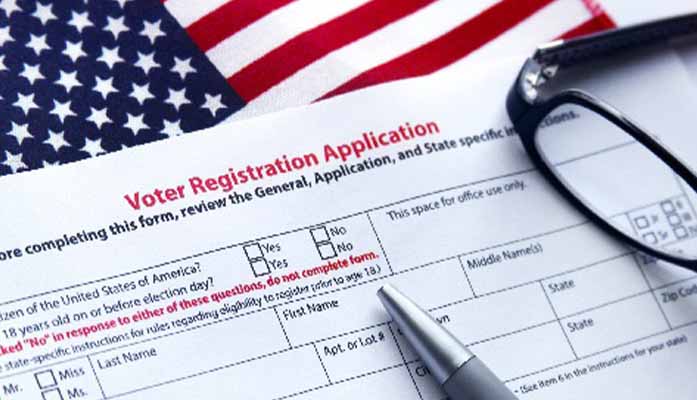
by Corinne Murdock | May 3, 2022 | News
By Corinne Murdock |
The U.S. House Select Committee investigating the January 6, 2021 incident announced on Monday that it requested a meeting with Congressman Andy Biggs (R-AZ-05). The committee called cooperation “a patriotic duty.” They asked that Biggs meet with them as soon as next Monday.
In a letter, the January 6 Committee informed Biggs of four of an undisclosed number of issues it wished to discuss.
The first issue concerned his participation in meetings to reject the election results, citing one House Freedom Caucus meeting which discussed a plan for former Vice President Mike Pence to refuse certain states’ electoral votes. The second issue concerned claims from Ali Alexander — an organizer of Stop the Steal, a campaign to resist the 2020 election results — that Biggs helped organize the January 6 protest. The third issue concerned Biggs’ communications with former President Donald Trump’s Chief of Staff Mark Meadows that reportedly marked efforts to persuade elected officials in overturning the 2020 election. The fourth issue concerned Biggs’ name appearing among those requesting presidential pardons for involvement in election overturning efforts.
The committee said that it would use Biggs’ cooperation to “make informed legislative recommendations.”
In raising each issue, the committee associated Biggs’ relation to Trump’s attempts to undermine American democracy and the Constitution, as well as Alexander’s calls for violence preceding January 6.
Biggs hasn’t issued a statement on the committee’s letter.
The committee also requested cooperation from Congressmen Mo Brooks (R-AL-05) and Ronny Jackson (R-TX-13). Each congressman received a letter tailored to their involvement in the January 6 rally and Capitol breach.
Brooks’ letter concerned his public remarks on a televised interview with CBS News and a press release in March. He claimed that Trump asked him to rescind the 2020 election results. Brooks said that he refused. The committee wanted to glean from Brooks additional evidence that Trump intended “to restore himself to power through unlawful means,” in a manner adverse to the Constitution.
Jackson’s letter was the lengthiest. It included encrypted text messages from the founder and various members of Oath Keepers, a right-wing militia organization formed to defend the Constitution against perceived violations from government. Those messages asked members that breached the U.S. Capitol on January 6 to locate and protect Jackson because he had “critical data to protect.”
The committee asked Jackson why those charged with seditious conspiracy were attempting to protect him. Additionally, they asked Jackson to expound on his participation in the rally preceding the Capitol breach and efforts to barricade the House Chamber during the breach.
Like Biggs, neither Brooks or Jackson have issued statements on their committee letters.
Corinne Murdock is a reporter for AZ Free News. Follow her latest on Twitter, or email tips to corinne@azfreenews.com.

by Corinne Murdock | May 2, 2022 | News
By Corinne Murdock |
Last Wednesday, Northern Arizona University (NAU) announced that it would grant free tuition to Arizonans with household incomes at or below $65,000 — about half of Arizona households qualify.
Free tuition came from NAU’s Access2Excellence (A2E) initiative to increase enrollment. NAU President José Luis Cruz Rivera explained in a press release that this latest development aligned with broader operational goals: access and equity.
“Affordability of college is top of mind for many, and this program ensures that tuition is not a barrier,” said Cruz Rivera. “It’s the embodiment of our university’s commitment to excellence and delivering equitable postsecondary value to all our students.”
NAU’s enrollment has been in steep decline over the years. Last fall, their total enrollment was over 28,700 students. The latest numbers mark a steady declining trend over the past three years: in fall 2020, they had over 29,500 students enrolled; in fall 2019, over 30,700 students enrolled; and in fall 2018, over 31,000 students enrolled. Prior to the last three years, NAU had grown steadily in its enrollment for over a decade. Their campus went from just over 20,500 students enrolled in 2006 to over 31,000 in 2017.
The Biden Administration likely spurred the free tuition initiative. In January, the Department of Education awarded $4.8 million to NAU for low-income students and low-wage or unemployed workers to achieve higher education.
According to a report from Pew Research Center last month, $65,000 would fall around the middle of middle-class income for a single individual: about $30,000 to $90,000. For households of five, middle-class income would range from over $67,000 to over $201,000.
NAU’s free tuition announcement came several weeks after the Arizona Board of Regents (ABOR) announced tuition and housing hikes at all three of Arizona’s public universities. NAU, along with Arizona State University (ASU), also announced an increase in its student meal plan costs — something University of Arizona (UArizona) didn’t do.
Under the ABOR changes, NAU students received a 3.5 percent tuition increase: around $11,000 to nearly $11,400. The increased tuition applied to both state residents and non-residents equally. Additionally, they will face an 3 to 3.5 percent increase in housing costs, along with additional course fees.
In March, NAU guaranteed that it would admit individuals that meet Arizona high school graduation requirements with a 3.0 or higher GPA.
The free tuition opportunity will take effect next fall. Housing costs won’t be covered.
Corinne Murdock is a reporter for AZ Free News. Follow her latest on Twitter, or email tips to corinne@azfreenews.com.

by Corinne Murdock | May 2, 2022 | News
By Corinne Murdock |
2020 established Arizona as a purple state going blue, but the latest voter registration data indicates that the state may be shifting back to red. The data appears to align with predictions that the new legislative maps would favor Republicans.
The Yellow Sheet Report first reported the voter base shift. They obtained the data from DeMenna Public Affairs, a Phoenix-based government relations, public affairs, and political consulting firm.
LD9 went from slightly Democratic at a 2.6 percent advantage, to slightly Republican at a .071 percent advantage. The Senate seat will either be taken by State Senator Tyler Pace (R-Mesa), Republican candidate Robert Scantlebury, or Democratic candidate Eva Burch. House LD9 candidates are Republican candidates Mary Ann Mendoza and Kathy Pearce, and Democratic candidates Lorena Austin and Seth Blattman.
LD4 and LD13 increased Republicans’ advantage from 3.4 to 11.25 percent and 1.6 to 7 percent, respectively.
The only Senate candidates for LD4 are State Senators Nancy Barto (R-Phoenix) and Christine Marsh (D-Phoenix) — if the data forecasts the outcomes, it appears Barto will take the seat. The House race will see sole Democratic candidate Laura Terech face off against two of the six Republican candidates: John Arnold, Kenneth Bowers Jr., Vera Gebran, Matt Gress, Jana Jackson, and Maria Syms.
Senate LD13 candidates are State Senator J.D. Mesnard (R-Chandler) versus either one of two Democrats: Cindy Hans or Michael Morris. As for the House seats, State Representative Jennifer Pawlik (D-Chandler) will face two of the five Republicans running: Josh Askey, Ron Hardin, Liz Harris, Don Maes, and Julie Willoughby.
LD2 increased steadily from a Republican lead of 3.8 to 6.28 percent. That may not bode well for State Representative Judy Schwiebert (D-Phoenix), the lone Democratic candidate running for one of the House seats. She may end up facing State Representative Justin Wilmeth (R-Phoenix) and one of the other Republican candidates: Christian Lamar, Pierce Waychoff, Neil Desanti, and Reynold Ramsey.
State Representative Steve Kaiser (R-Phoenix) is uncontested in the Senate LD2 primary, and will face off against one of the two Democratic candidates: Jeanne Casteen or Victoria Thompson.
LD8 Democrats lost just under 45 percent of their advantage, dropping from 27.5 to 12.36 percent. State Senator Juan Mendez (D-Tempe) retains a decent margin against either of the Republicans running for the Senate seat: Roxana Holzapfel or Todd Howard. Vying for the House seats are State Representatives Melody Hernandez (D-Tempe) and Athena Salman (D-Tempe) as the Democratic candidates, with Republican candidates Caden Darrow and Bill Loughrige.
LD12 Democrats lost just under 66 percent of their advantage, dropping from 53.9 to 35.36 percent. State Representative Mitzi Epstein (D-Chandler) will likely win the Senate seat against either one of the Republican challengers: David Richardson or Suzanne Sharer. As for the House seat, five Democrats and two Republicans are vying for the seats: Democratic candidates Patty Contreras, Sam Huang, A.J. Kurdoglu, Stacey Travers, and Paul Weich versus Republican candidates Jim Chaston and Terry Roe.
Only one legislative district shrunk for Republicans: LD16, where the advantage dropped from 3.6 to 1.04 percent. That makes the Senate race tighter for State Senator T.J. Shope (R-Phoenix) and Republican Daniel Wood, either one of whom may face Democrat Taylor Kerby. State Representative Teresa Martinez (R-Oro Valley) has two other Republicans in the race, Rob Hudelson and Braden Biggs, and one Democrat, Keith Seaman.
Corinne Murdock is a reporter for AZ Free News. Follow her latest on Twitter, or email tips to corinne@azfreenews.com.

by Corinne Murdock | May 1, 2022 | Education, News
By Corinne Murdock |
The latest endeavor from Arizona State University (ASU), a full-time online high school that awards university credits, offers a curriculum focused on woke ideologies on the taxpayer’s dime.
The bulk of the program relies on daily seminars in addition to online lessons, small-group tutorials, and peer tutoring. The sample of seminar subjects challenge students on ethical norms, such as editing the human gene pool, freedom of speech versus “freedom of reach,” social media moderation, and life extension. The seminars are student-led and supported by learning guides and guest experts.
All this at no cost to students who are Arizona residents. Instead, the state covers the cost. Students in other states would pay close to $10,000 a year, and students outside the country would pay nearly $13,000.
The program, ASU Preparatory Academy’s Khan World School, is poised to launch in August with 200 students to start. If all accepted students were Arizona residents this fall, that would cost taxpayers anywhere from $2 million to $2.6 million.
Rather than tests, the academic model emphasizes discussion with teachers, peers, and “industry experts” for learning and assessment. Students advance through a mastery-based model. At the end of the program, students will receive a transcript with final grades for college admissions and scholarships.
Specifics on curriculum weren’t offered. The program asserted that each student would receive their own custom plan.
Governor Doug Ducey called the program a “groundbreaking innovation.”
“Choice in education works and Arizona leads the nation in school choice!” tweeted Ducey.
ASU offered a quiz for students to determine their fit for the program. Only one of the seven questions related to academic competency.
The first question asks the student to select the desk that best represents their mind: “Albert Einstein’s Mess,” “Marie Curie’s Order,” or “Katherine Johnson’s Spotless.” The second question asks the student what time their alarm wakes them up: before the sun, before lunch, before dinner, or “lol, what alarm?”
A third question asks the student how many books they read in a month: none, one or two, or three or more. A fourth question asks the student who they turn to for answers: Google, their friend, their family, or themselves. A fifth question asks the student which animal best describes their learning pace: slothful, steady, or sprinting.
It’s not until the sixth question that the student is asked about something to do with core subjects. The student must answer a math question about where the vertex of a parabola would fall.
The seventh question reverts to a social question about the student’s way of thinking versus that of their friends.
The online lessons are a mix of Khan Academy and ASU course content. In order to be admitted, students must be entering their freshman year of high school, proficient in Algebra I, earned grades A or B in 8th grade Math and English Language Arts, and in possession of a computer with a web camera and internet access. Algebra I proficiency appeared to be measured by proof of program completion. Other than that, admissions doesn’t require a GPA or any other academic standards.
Corinne Murdock is a reporter for AZ Free News. Follow her latest on Twitter, or email tips to corinne@azfreenews.com.

by Corinne Murdock | Apr 30, 2022 | News
By Corinne Murdock
The Maricopa County Recorder isn’t just dedicated to elections — he’s dedicated to commemorative literature. Maricopa County Recorder Stephen Richer bought multiple copies, or “a box,” of a book satirizing the Arizona Senate’s 2020 election audit, “Goodnight Audit,” a parody of the classic children’s book, “Goodnight Moon.”
“Goodnight Audit” author Trevor Nelson, a parent activist and marketing manager, shared Richer’s post.
Nelson’s tweet from early last May served as inspiration for the cover art of the book. The post played on the name of Senate President Karen Fann (R-Prescott), pointing out a fan left on in the abandoned room.
The original inspiration for Nelson’s post came from Garrett Archer, ABC15 Data Analyst and former Arizona Secretary of State Senior Elections Analyst, who pointed out that the auditors left a fan running on site after they’d left for the day.
Several weeks later, Nelson launched a Twitter account to help fundraise for the parody book, @goodnightaudit. “Good Night Fan” was to be the book’s original title.
Corinne Murdock is a reporter for AZ Free News. Follow her latest on Twitter, or email tips to corinne@azfreenews.com.





